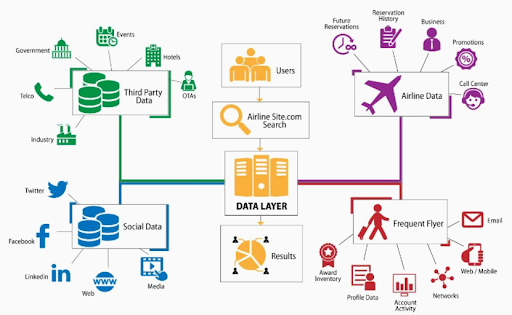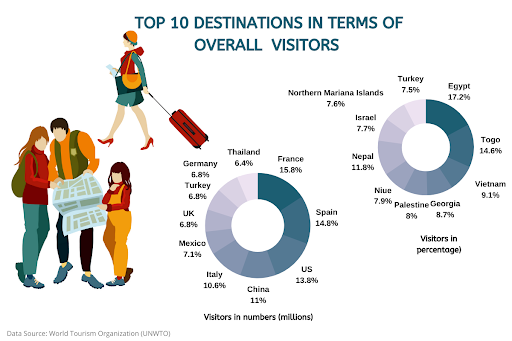Business Benefits of Big Data in Travel Industry
The capitalization of the travel industry is constantly growing: according to Deloitte analysts, the total market volume has already reached $2 trillion in 2020 and continues to grow. The fight for the client in a growing market is taking place with high technologies - players are actively using AI and VR to create personalized offers and help choose the ideal hotel or vacation spot for the user. And geoservices solve the eternal problem of lost luggage.
Since selling the first e-ticket from San Francisco to Las Vegas in June 1995, the travel industry transformation strategies have evolved into a technology addict. Any solution that helps optimize transportation costs or improve the quality of passenger service will be tested and integrated into the supply chain in case of even minimal success. Today, the face of the modern tourism industry is shaped by AI-based solutions, VR and geo-services that help make the trip for the client safe and convenient.
Let's see why even the most minor profit guarantees introducing innovative technology into the tourism industry.
Why tourism is essential for cities
Making your city a tourist city is not only in the interests of travel agencies, hotels or restaurants but of the whole society and the city. In fact, tourism is a serious sector of the economy, accounting for more than 15% of the GDP in 44 countries around the world. For example, the United States earns $1.8 trillion from tourism, which is 8.6% of the country's GDP, according to the World Travel & Tourism Council.
Increase income
To maximize the income of a hotel, shop or travel agency, you should offer the right product to the right customer at the right time with the right price and in the right way. You must clearly understand the situation to hit all these "right" and "necessary" targets. And big data can come in handy. But we advise to read our article on SaaS compliance management before you start working with big data.
With the help of Big Data, you can predict increased demand. Holidays with children or air ticket sales, holidays or just good weather - all these factors increase the demand for hotel rooms and other services that tourists willingly use. Knowing this, the tourism business can effectively adjust prices: raise prices during rising demand and, conversely, offer promotions when demand falls.
Define your client
Marketing in the tourism industry is a serious challenge because customers are always different and from different cities, countries and even continents. Every business owner or manager constantly asks himself the question:
- How to expand the business?
- Where to open a new hotel, restaurant, etc.?
- What new services might interest my clients?
- Is advertising for my business effective?
The Big Data team at Ardas can provide a clear answer to each question. And it does not matter if a large company or a small local business asks about it. We propose to build a client profile based on big data analysis.
How it works
For a client portrait, a certain set of impersonal characteristics is needed. Namely:
- floor;
- age;
- income level;
- social status;
- marital status;
- the presence of children;
- place of residence;
- how often the client travels abroad
- whether he is a car;
- What are his habits and interests?
A former client portrait helps to make the offer more relevant. Based on big data analysis, Ardas develops models that accurately determine the customer profile.
Reach out to the client
In 2020, according to Statista, global businesses spent $578 billion on media advertising alone. Meanwhile, not all advertising has reached its target audience. As a study of European markets has established, only about half of advertising finds a potential client. The rest are a waste of money.
Let's say a hotel in Barcelona wants to attract fans of outdoor activities because there are mountains, the sea, and a lot of entertainment nearby. However, potential hotel customers live in different countries, so advertising on radio stations, billboards or social networks may not be affordable for the hotel. And why such expenses if there is a cheap way to contact your audience directly?
With the help of targeted email newsletters, you can reach your target audience without investing in marketing.
- Why is it available? You invest in advertising that will definitely "reach" the client.
- Why is it effective? Because, firstly, you offer your product or service to a client who is already interested in it. And secondly, people pay attention to emails because these are usually important messages for them - from the post office, bank or delivery service.

How is big data applied in the tourism industry?
Tourism is a very broad field, it has giants like TripAdvisor, booking.com, Airbnb, and a lot of small players. Large companies have a huge number of tasks that machine learning helps to solve: from trying to predict conversion and ranking search results to analyzing reviews and building a recommendation system for users.
Machine learning is a method and technology that allows you to find patterns in large amounts of data automatically. For example, you can determine which hotel characteristics affect user satisfaction or learn from the user's travel history to choose the destinations to which the client is most likely to buy a ticket.
Big companies have a lot of data: pictures, hotel data, and reviews. This data is often of very low quality: for example, photos with poor resolution or from the wrong hotel, there are also many errors in the description of hotels - for example, the description lists amenities such as a washing machine, and iron, but in fact, there are none. In this regard, the tasks of verifying information from data arise, and now all the big players are actively implementing computer vision systems. They will allow you to recognize what is shown in the pictures, to classify the pictures - to understand, for example, which room is shown in the photo: a bathroom, a bedroom, and so on.
There are also challenges in determining the style and quality of photographs with which hotels sell better. There are scientific works on detecting image quality, where the neural network selects the best photos for sales.
Another one of the big challenges in the travel business that is similar to the credit scoring challenge is knowing if a person will cancel a booking. The fact is that from the moment when a person makes a reservation until the moment of his settlement, it usually takes some time. This is similar to the situation when a person takes out a mortgage to buy real estate and you need to predict the probability with which he will return this money to the bank. Before the trip, the client's circumstances may change, and usually, the aggregator or the hotel already has some data about the client. Also, the aggregator knows the data about the hotel supplier, there is a history of how often reservations are canceled for this supplier. An essential task for business, which will significantly optimize the distribution of numbers, is to understand in a timely manner what actions the client will take and minimize their losses. Based on all this data, you can build powerful predictive models.
But these are the tasks of the big players. In smaller companies, there is a problem that user conversion does not increase from the introduction of machine learning since the flow of customers is small, and it is difficult to achieve a significant effect from machine learning. There are a lot of such companies, so far advanced machine learning is not very useful for them, but classical analytical tools, optimization methods, and so on work well.
There are some problems with booking air tickets. Airline sales are a tough, low-margin business, and there are also challenges that machine learning can help with. For example, there is also the task of predicting whether a person will cancel a plane booking, whether he actually went to the site to buy a ticket, or whether he is simply interested in this direction. Of course, the main focus in air travel is to optimize routes for customers, but this is more about algorithms and analytics than predictive modeling.
Third-party products for hoteliers are also appearing: for example, mailing optimization services that allow you to understand which site visitors should not send advertising mailings, as well as various metasearch engines that try to predict the conversion of a client coming to the site.
But still, at present, the main application of machine learning is found in booking tasks. And now, all articles on machine learning in the tourism industry are published by large booking companies, they also hold leadership at professional meetups and conferences.
Trends in big data analytics in the travel business
At an Indian startup, the team is redefining how they approach the industry. In this approach, the client comes to the site and says what he wants to get on his vacation: go skiing or go to the sea, or go to a concert, and so on. The system then selects offers for the client based on the analysis of the reviews. In addition, there is a lot of cheap labor in India: they have the opportunity to send special employees to collect data about the surroundings of hotels and attractions, thereby forming geodatabases of interesting places. As a result, the client can ask for the service he wishes and get a ranked list of recommended places that best meets his request.
The same startup puts a lot of effort into building chatbots. In the usual interface, the client comes to the site, fills in the direction and selects a hotel from the proposed list, and the new idea is that the client interacts with the interactive dialogue system. It asks him clarifying questions and generates the most relevant output based on his answers. In tourism, there is indeed a big trend towards the creation of smart chatbots, here, this direction has very great prospects.
Airbnb recently started selling experiences - this is a complete package of opportunities, including a trip to some country, a guide, and an excursion, attending events. When a person plans his vacation, there are a lot of different aspects: in addition to checking into a hotel, you go to museums, go in for sports, and have lunch. And now, no one builds this whole path for you, everything is fragmentary - you can buy tickets in one place, book a hotel in another, plan a vacation on your own or through friends. And if you make a dialogue system that will guide you completely through your journey, and which you can contact at any time and ask where to watch something interesting in a couple of hours, this greatly changes the whole approach in the industry as a whole, changes the structure of the market.

And this is the concept that Airbnb and many other players are moving towards: from being a booking site to becoming a site for selling “experiences”, but this is still in development.
How accessible is data in the travel industry?
Everything is complicated with data. There is practically no open data, it is difficult to obtain high-quality data because many, even large companies, aggregate information from other business players, that is, they acquire content from third parties.
Most of the data come from reviews, large players have hundreds of millions of them, and their analysis is a very promising topic. For example, based on reviews, you can build personal assistants, those same chatbots. In the reviews, users write a lot, often describing not only their experience of staying in a particular hotel but also tell what they did nearby: they took a guide, saw an exhibition in a museum, visited a restaurant across the road and it was delicious there ... This is how reviews appear on some activities around the hotel, reviews are also formed about them, all this creates a new system by which you can build recommendations. TopRater.com, for example, tried to make a hotel search engine based on data from user reviews and not those provided by the hotelier.
The main problem with reviews is that they are often used to generate interest, a lot of fake reviews are created - you need to be able to deal with all this and this can also be done using machine learning methods, for example, to identify and ignore reviews that contain very few personal details. They are typical (“good hotel, nice staff”).
In addition to reviews, there are many photos that you can work with using artificial vision methods and image recognition. And there is also booking and user data, and the larger the player, the larger arrays he has.
The future of big data and tourism
What we can expect from the future is that cities and tourism players will increasingly use big data to their advantage. This will truly revolutionize what cities offer visitors and residents alike. With initiatives around the globe, intelligent travel is the way of the future for tourism.
Ardas has years of experience in big data and is ready to help you apply it to your project and other business analytics implementation!
